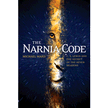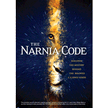I know I'm in good company when I say that I've loved the Chronicles of Narnia ever since I was a little boy; I'm guessing that a majority of the people reading this probably have similar stories. I was a young teenager when I first discovered them, and I still have my original set of the seven books. I remember being so excited by what most people would consider a clear allegory of Christ's death and resurrection in the first book, and then puzzled when the rest of the books really contained very little that resembled any stories or characters from the Bible. But I loved the books anyway, and as I grew older I read more and more of C.S. Lewis' work... actually, I read everything I could get my hands on, from the Space Trilogy to his amazing works of apologetics to The Screwtape Letters and even a few things he wrote before becoming a Christian. In college I literally read everything by him that they had in the university library.
I've always been so impressed with how methodical and thorough of a thinker Lewis was. That's one reason the Chronicles seem to be a little bit of an anomaly; they seem to be related mostly by the geography of the world of Narnia and the person of Aslan Himself, and frankly, in a few of the books Aslan barely even appears. And then there are other odd things in the books... Father Christmas, for goodness sakes? What's with that? Why would they even know about Christmas in Narnia anyway? I think I basically just sort of wrote those things off, thinking that Lewis was writing the books to entertain children, or maybe just sort of to blow off steam, and that there was not too much rhyme or reason to the whole thing.
That is, I thought that way... until now.
Michael Ward's new book The Narnia Code presents a theory of what holds the books together which rocked my whole concept of the series, and which, to a fan of C.S. Lewis' entire body of work, has a ring of truth to it. When I started reading, you could have colored me intrigued; by the end, you can color me convinced.
Basically, Ward believes that Lewis, who was a professor of medieval literature, used the medieval concept of the universe as a framework for the series. Before Copernicus came along with a whole different idea of the way the universe was organized, it was believed that the Earth was at the center of the universe, and there were seven "planets" that circled around it in concentric orbits (the "planets" were the Moon, Mercury, Venus, the Sun, Mars, Jupiter, and Saturn... our understanding of the moon and sun as different from those other planets didn't appear until a bit later, and planets past Saturn were not discovered until the invention of the telescope). Each of the planets was associated with a mythological deity, and those gods was associated with certain things. Each book is based around the superstitious and mythological concepts surrounding one of these planets/gods. The Lion, the Witch, and the Wardrobe is, for example, the "Jupiter" book, because Jupiter was considered the god of joviality (which explains why when joy begins to return to Narnia as winter breaks, the jolly Father Christmas appears), and Prince Caspian, which is all about war, is based on Mars, who was the god of war. The planets and books line up quite nicely; if you're interested in finding out more details, I'll refer you to the official Web sites at the bottom of this article, and to the book itself (click here to purchase it from ChristianBook.com).
The Michael Ward book itself was, if I understand it correctly, based on the BBC film of the same name (discussed below), and the BBC program was based on Ward's earlier book, Planet Narnia. I have not yet read Planet Narnia (I plan to take a look at it very soon), but my understanding is that it is a more scholarly book, while The Narnia Code is more targeted at the layman. The first few chapters lay out the way Ward came to make his discovery of the link between the books and medieval astronomy, and then it goes straight into explaining the thematic elements of each book, one at a time. I found the initial few chapters a little long for my taste; but once he finally got into the themes of the individual books, I was so hooked! In addition to being a huge fan of C.S. Lewis, I've long been a fan of ancient Greek/Roman mythology, and the connections seem obvious once they're pointed out. It made me want to go back and re-read the Chronicles themselves again, to sort of sniff out the links for myself. The book is an enjoyable read for any fan of the series; you'll want to read it a chapter at a time and digest the information before moving on to the next one.
(For the record, Ward makes it clear, as Lewis did, that the books are most definitely about Jesus Christ; Ward is not trying to say that Aslan is Zeus or anything like that. The idea is that Lewis used the planets and their mythological associations to create the atmosphere for his stories and to point up different aspects of Christ's character, not that Aslan represents a different pagan god in each book.)
Shortly after I read the book, I was at the Christian bookstore near my house, and to my surprise, I spotted the DVD of the BBC program on the shelf! My understanding was that it would not be available until early 2011, but there it was! I snagged a copy and watched it with my family. Surprisingly enough, the DVD contains very little information about the whole "planets" idea; most of it is a biography of Lewis himself. The main program doesn't even give the whole list of "this book matches this planet" associations (although you can find that in the DVD bonus features). I was expecting more about the planets theory, but I found the biography of Lewis interesting and, in a few cases, it even presented information about Lewis that I had not heard before (and I've read quite a bit about Lewis over the years). I enjoyed the DVD just as much as I enjoyed the book, although in a different way; the two complement each other nicely.
If you love the Chronicles of Narnia books, you will at least find The Narnia Code interesting. You may agree with Ward, as I do, or you may think he's a crackpot trying to make a buck off Lewis' legacy, and you may even find the idea that Lewis drew part of his inspiration from stories of pagan gods and goddesses vaguely offensive. But the theory is compelling and the evidence is extensive, and as a Narnia fan, you owe it to yourself to look into these books. It will change the way you see the series forever.
I was provided with a review copy of the book version by Tyndale House Publishers. I purchased the BBC DVD on my own. The opinions expressed in this review are mine alone.
Web links:
My review of Planet Narnia
NarniaCode.com - buy the book - buy the DVD
PlanetNarnia.com - buy the book
MichaelWard.net (the author)
Saturday, December 11, 2010
Subscribe to:
Post Comments (Atom)






No comments:
Post a Comment